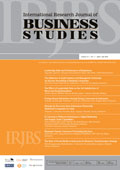Article Metrics |
|
|
The Effects of Job Autonomy on Work Outcomes: Self Efficacy As An Intervening Variable
Abstract
The purpose of this research was to examine the relationship between job autonomy and work outcomes (job performance, job satisfaction and job stress), self efficacy as a mediating variable. This research also investigated the impact of job satisfaction on job performance and job stress on job performance. Va-riables in this research were measured via a survey of 190 banking salespersons in D.I. Yogyakarta and Solo. Structural Equation Modeling (SEM) were used to examine the effects of job autonomy on work outcomes, job satisfaction on job performance, and job stress on job performance. Results showed that the esti-mated model in this research is acceptable based on its score of the goodness of fit index. The structural relationship showed that job autonomy significantly related to job satisfaction and performance, but not significant with job stress. It also showed that self efficacy partially mediated the relationship between job autonomy and job satisfaction, and job performance. In addition, this research found that self efficacy not mediated the relationship between job autonomy and job stress. There was no significant relationship between job autonomy and job performance but this research showed that job satisfaction significantly related to job performance. Finally, these results had an important implication to managers in designing job.
DOI :https://doi.org/10.21632/irjbs.4.3.203-215
DOI :https://doi.org/10.21632/irjbs.4.3.203-215
Keywords:
Job autonomy, Job Satisfaction, Job performance, Job Stress, Self efficacy
Full Text:
Copyright (c) 2015 INTERNATIONAL RESEARCH JOURNAL OF BUSINESS STUDIES
International Research Journal of Business Studies has been covered by the following services: | ||||||||||||||||||||||||
|



















